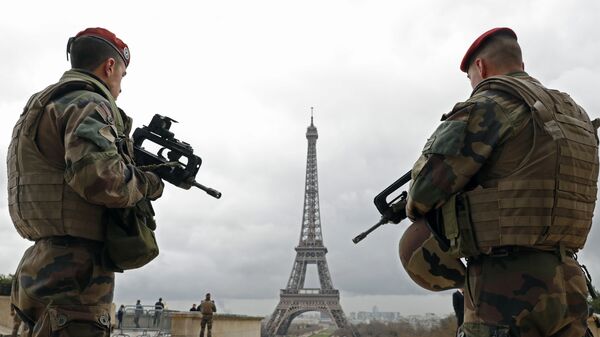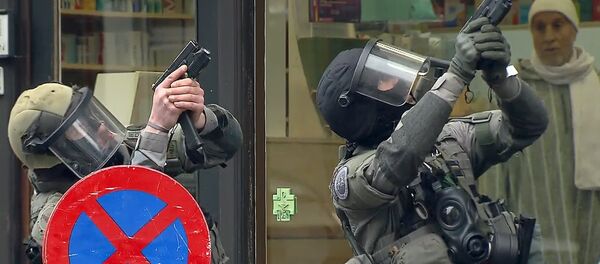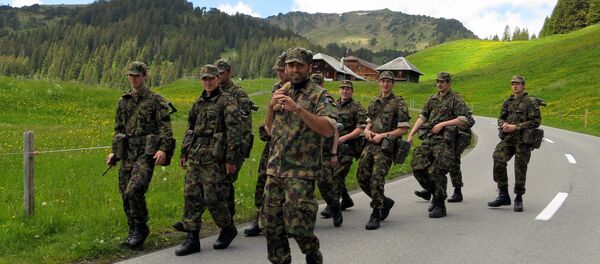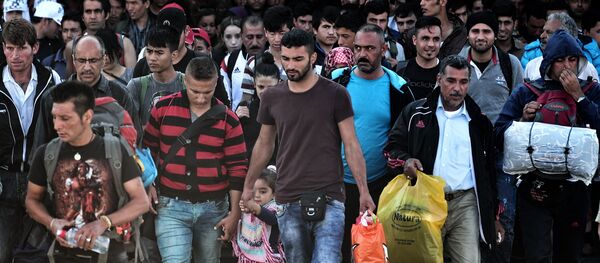Speaking at a recent conference of the Council on Foreign and Defense Policy (SVOP), a Moscow-based NGO devoted to security and foreign affairs, Timofei Bordachev, director of the Faculty of World Economy and International Affairs at Russia's Higher School of Economics, and Vladimir Vorozhtsov, security analyst and retired Major General of the Russian Ministry of Internal Affairs, offered their expert opinions on why European leaders have been unable to deal with the problems that threaten the continent. Russian online newspaper Lenta.ru recorded their discussion.
Contemporary Terrorism and the West
The key difference between the terrorists of decades and centuries past, and those of the present, the analyst added, is that "contemporary terror is waging a war not only against Europe," or any one country in particular, "but against the whole of Western civilization. And often the countries that find themselves under attack are not those which, from the terrorists' view, are the most to blame, but those that are most defenseless," Belgium being a prime example.
"This," Bordachev noted, "is the main new development of modern terrorism. For the Western world, the situation is, of course, a huge challenge, because the European elites will now have to make some very difficult decisions about changes in the socio-political systems in their countries."
"When riots broke out ten years ago in the suburbs of Paris populated by immigrants from the Middle East and North Africa, they had mostly social causes. These disturbances showed the inability of the French state to effectively solve the problem of migrant adaptation, and their integration into society. Now the situation is fundamentally different – we see that the present outbreak of political terrorism in Europe bears not a social, but an ideological character."
Unfortunately, he warned, "the situation is gradually changing. The November attacks in Paris showed that the terrorists are now capable of organizing and carrying out multi-stage coordinated attacks. Therefore, in the near future, we should be weary of a sharp increase in the terrorist threat level. All of this is complicated by the fact that local law enforcement agencies have very few resources enabling them to counter terrorism."
At present, Bordachev cautioned, "European security forces are forced to work under unfavorable political guidelines (for example, under the infamous concept of 'political correctness'), and under laws that are largely obsolete. The sluggish police reaction to the riots in the city center on New Year's Eve is a clear illustration of this state of affairs. The police were simply afraid to apply force against the excesses by the migrants, so as not to cause the inevitable scandal in the media and incur social criticism."
If Europe seeks to adequately protect itself against the threat of terrorism, it must, first of all, adhere to the principle of equality before the law, according to the analyst. "Frequently, authorities leniently overlook the illegal behavior of migrants, thereby contributing to the emergence of feelings of impunity and permissiveness. At the same time, crimes committed by the indigenous population are punished with disproportionate severity. In order to avoid such contradictions, it is necessary either to change the laws, or at least to comply with them."
"The current European terrorists are attempting to assert themselves, and to intimidate the local population, but have not yet put forward any political demands, such as the Chechen terrorists in Russia's Budyonnovsk, in Moscow or in Beslan." Were this to take place, and if terrorist acts were backed up by political, media and 'civil society campaigns', "the terrorist threat to Europe would become more severe and dangerous," Vorozhtsov said.
Migration Crisis is Really Crisis of Governance
When it comes to the migrant crisis, Bordachev noted Europe must, first and foremost, be willing to stand up to political blackmail from third parties. "Today, Turkey has played the role of extortionist brilliantly, managing to get 5 billion euros for a promise to stop the flow of refugees to Europe. But the main cause of this migration crisis is the Turkish president, who skillfully sent Syrian refugee flows toward Greece last year. Experience shows that if a blackmailer achieves his goals, he will only become more brazen."
Today's Europe, Bordachev added, "is not experiencing so much a migration crisis as a crisis of political governance, both at the EU level, and at the level of several individual states."
"For example, Greece violates its obligations before its partners in the EU and opens its borders to refugees not due to ill will, but as a result of objective circumstances. The Greeks simply do not have the physical capacity to comply with their obligations, and don't have the money, the resources or the people to cope with the huge influx of migrants."
"And this problem is not new; it goes back to the last decade, when, during the 'boat migration' from North Africa to southern Europe, some states, such as Italy, repeatedly raised the issue of the need to conduct coordinated EU policy on financing and solving this complex issue. But every time such attempts were met by strong resistance in Germany, which is surrounded by Schengen neighbors, and therefore could afford not to protect its borders."
The latest crisis surrounding Syrian refugees, Bordachev said, "is the result of EU countries' inability to agree on the need to ensure the stable operation of the Schengen mechanism. Therefore, the events that began last year are often referred to not as a migrant crisis, but a crisis of European solidarity, and an inability to develop an effective common policy. The old system, laying commitments for receiving migrants in the border-area countries, no longer works, but Europeans have been unable to articulate new rules."
"When vast areas to the south and southeast of the EU's borders enter a long period of social and political instability (and in some places outright chaos), huge masses of people are inevitably pushed by these processes toward a peaceful and wealthy Europe. The need for urgent measures to ensure the protection and defense of borders is obvious, but for some reason, nothing is done. Such a program could be competently set up in one year's time, and with proper implementation and continuous funding, could have the first positive results" in the years thereafter.
Migration, Terrorism, and the Lingering Problem of National Sovereignty
Ultimately, Bordachev emphasized, "it is necessary to correctly understand the nature of Europe's current problems. Many believe that the countries of the EU have given up their national sovereignty, but in fact this is not the case. The recent crisis in the euro area was caused by the lack of a common economic policy, and the migrant crisis –by a lack of a common policing policy."
"Both of these areas are aspects of the sphere of public benefits (social security, the economy, security), the distribution of which is the primary function of any sovereign state. For this reason, the EU's common economic and migration policy has been the most disastrous, since no European country seriously plans on giving up its national sovereignty."







